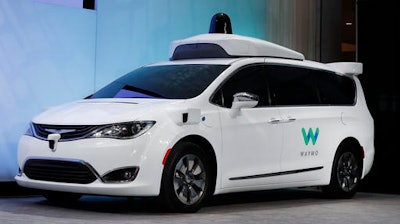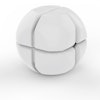
DETROIT (AP) — Waymo, Google's self-driving car division, will start testing its new fleet of minivans on public roads in California and Arizona later this month.
The minivans, built in collaboration with Fiat Chrysler, are Chrysler Pacifica hybrids outfitted with Waymo's own suite of sensors and radar. Waymo and FCA announced their partnership in May.
In a speech at the Detroit auto show Sunday, CEO John Krafcik revealed that Waymo built the sensors, radar and software for the new minivans itself.
Krafcik said the company felt the system would work better if it was developed specifically for self-driving instead of using off-the-shelf parts.
"A single integrated system means that all the different parts of a self-driving car work together seamlessly," Krafcik said.
Waymo also was able to significantly lower the cost of the system, Krafcik said. The rooftop lidar — which uses lasers to give the car a three-dimensional picture of the world — cost $75,000 a few years ago. Waymo has brought that cost down by 90 percent and has developed its own short-range and long-range lidar. Waymo's long-range lidar can see a football helmet two football fields away.
Krafcik didn't say exactly how Waymo lowered the costs. But the announcement could concern suppliers like Velodyne, which makes lidar systems used by Ford Motor Co. and others, and Delphi Corp., which is developing its own autonomous driving system.
Stephanie Brinley, an auto analyst for IHS Markit, said Google won't control the market for self-driving technology, so other suppliers with go ahead with development of their own systems. But some smaller players in the nascent industry are "going to fall away," she said.
Waymo has repeatedly said that it doesn't plan to build its own cars, but provide self-driving systems to established carmakers, car-sharing services or others. In addition to FCA, Honda Motor Co. recently announced that it's in talks with Waymo about using its technology in Honda vehicles.
Krafcik said Waymo, which has been developing self-driving cars for eight years, expects to reach 3 million miles of test-driving this May.






















